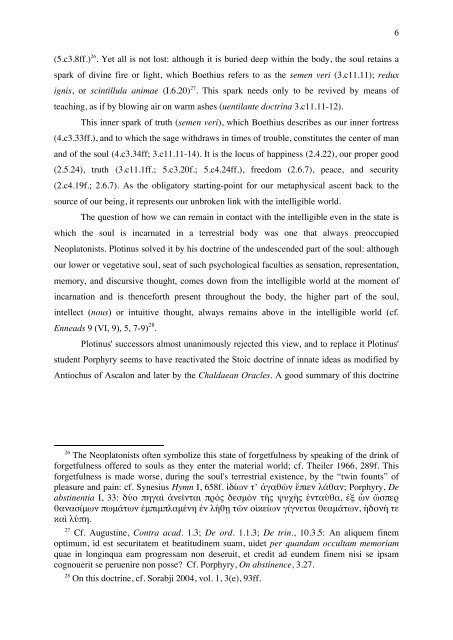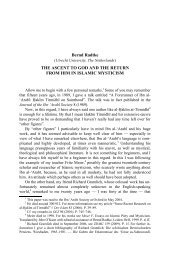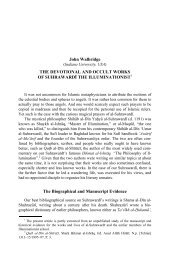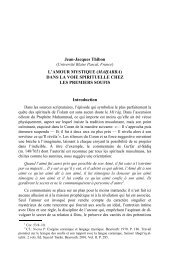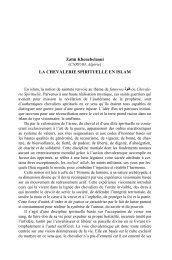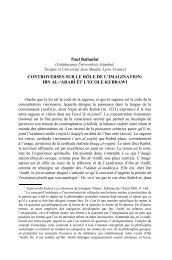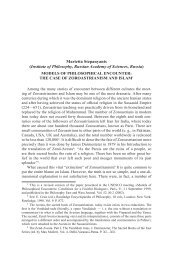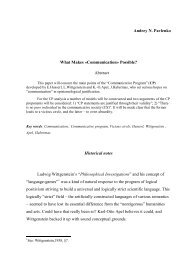Bothius talk DEF
Bothius talk DEF
Bothius talk DEF
You also want an ePaper? Increase the reach of your titles
YUMPU automatically turns print PDFs into web optimized ePapers that Google loves.
6<br />
(5.c3.8ff.) 26 . Yet all is not lost: although it is buried deep within the body, the soul retains a<br />
spark of divine fire or light, which Boethius refers to as the semen veri (3.c11.11); redux<br />
ignis, or scintillula animae (I.6.20) 27 . This spark needs only to be revived by means of<br />
teaching, as if by blowing air on warm ashes (uentilante doctrina 3.c11.11-12).<br />
This inner spark of truth (semen veri), which Boethius describes as our inner fortress<br />
(4.c3.33ff.), and to which the sage withdraws in times of trouble, constitutes the center of man<br />
and of the soul (4.c3.34ff; 3.c11.11-14). It is the locus of happiness (2.4.22), our proper good<br />
(2.5.24), truth (3.c11.1ff.; 5.c3.20f.; 5.c4.24ff.), freedom (2.6.7), peace, and security<br />
(2.c4.19f.; 2.6.7). As the obligatory starting-point for our metaphysical ascent back to the<br />
source of our being, it represents our unbroken link with the intelligible world.<br />
The question of how we can remain in contact with the intelligible even in the state is<br />
which the soul is incarnated in a terrestrial body was one that always preoccupied<br />
Neoplatonists. Plotinus solved it by his doctrine of the undescended part of the soul: although<br />
our lower or vegetative soul, seat of such psychological faculties as sensation, representation,<br />
memory, and discursive thought, comes down from the intelligible world at the moment of<br />
incarnation and is thenceforth present throughout the body, the higher part of the soul,<br />
intellect (nous) or intuitive thought, always remains above in the intelligible world (cf.<br />
Enneads 9 (VI, 9), 5, 7-9) 28 .<br />
Plotinus' successors almost unanimously rejected this view, and to replace it Plotinus'<br />
student Porphyry seems to have reactivated the Stoic doctrine of innate ideas as modified by<br />
Antiochus of Ascalon and later by the Chaldaean Oracles. A good summary of this doctrine<br />
26 The Neoplatonists often symbolize this state of forgetfulness by speaking of the drink of<br />
forgetfulness offered to souls as they enter the material world; cf. Theiler 1966, 289f. This<br />
forgetfulness is made worse, during the soul's terrestrial existence, by the “twin founts” of<br />
pleasure and pain: cf. Synesius Hymn I, 658f. ἰδίων τ’ ἀγαθῶν ἔπιεν λάθαν; Porphyry, De<br />
abstinentia I, 33: δύο πηγαὶ ἀνεῖνται πρὸς δεσμὸν τῆς ψυχῆς ἐνταῦθα, ἐξ ὧν ὥσπερ<br />
θανασίμων πωμάτων ἐμπιμπλαμένη ἐν λήθῃ τῶν οἰκείων γίγνεται θεαμάτων, ἡδονή τε<br />
καὶ λύπη.<br />
27 Cf. Augustine, Contra acad. 1.3; De ord. 1.1.3; De trin., 10.3.5: An aliquem finem<br />
optimum, id est securitatem et beatitudinem suam, uidet per quandam occultam memoriam<br />
quae in longinqua eam progressam non deseruit, et credit ad eundem finem nisi se ipsam<br />
cognouerit se peruenire non posse? Cf. Porphyry, On abstinence, 3.27.<br />
28 On this doctrine, cf. Sorabji 2004, vol. 1, 3(e), 93ff.


